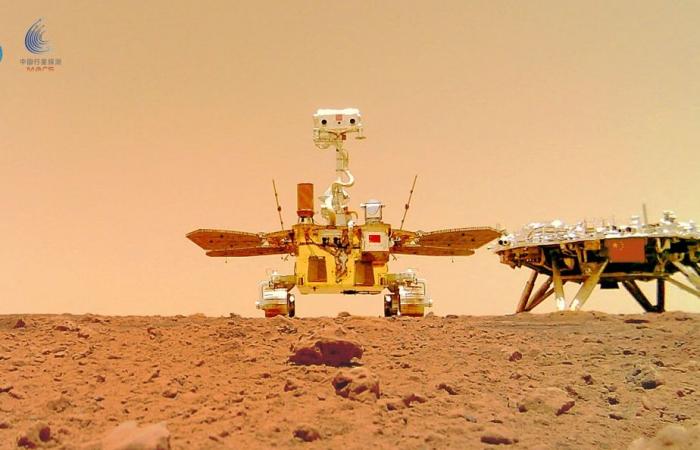(Paris) A Chinese rover has found new clues to the presence of an ancient ocean on Mars, by identifying traces of shorelines that water could border, according to a study published Thursday.
Published at 1:20 p.m.
Daniel LAWLER
Agence France-Presse
The theory defending the presence of an ocean that covered more than a third of the Red Planet, however, remains debated, and a researcher who was not involved in the study questioned the validity of the latest discoveries.
The astromobile Zhurong was deposited in 2021 on a plain in the Northern Hemisphere, in the Utopia region, which contains evidence of a past presence of water.
The main author of the study published in NatureBo Wu, of the Hong Kong Polytechnic University, told AFP that a series of features pointed to an ancient ocean: “hollow cones, polygonal crossings and currents carved” into the ground.
Previous research suggested that the hollow cones may have originated from mud geysers, and often formed in areas that contained water or ice.
The information collected by the rover, as well as satellite data, also suggests the presence of a nearby coastline, according to the study.
The researchers imagine a scenario in which the ocean was formed by flooding around 3.7 billion years ago. Before freezing, tracing a coastline, then disappearing, around 3.4 billion years ago.
Mr. Bo insisted that the team is not “claiming that the findings definitively prove that there was an ocean on Mars.”
This level of proof will likely require a mission to bring Martian soil samples back to Earth for examination.
“She is active”
Another scientist who analyzed other signs of a possible ocean, Benjamin Cardenas, said he was “skeptical” about the study’s conclusions.
He believes the Chinese team did not take enough into account the extent to which the strong Martian wind carried sediments and eroded rocks over a few billion years.
“We tend to consider Mars to be not very active, like the Moon, but it is active! “, this researcher at the American University of Pennsylvania told AFP.
He said previous research using computer models had suggested that “even low Martian erosion rates” would destroy traces of an ancient coastline over such periods of time.
Bo acknowledges that wind may have worn away some rocks, just as meteorite impacts can “excavate underground rocks and sediment to the surface from time to time.”
Even if the theory remains disputed, and despite his reservations, Mr. Cardenas “tends to think that there was an ocean on Mars”.
Finding the truth could help solve a bigger mystery: whether Earth is the only planet in the solar system capable of supporting life.
“Most scientists believe that life on Earth arose either at the bottom of the oceans where hot gases and underground minerals were found, or just near the surface in small tidal pools,” Mr. Cardenas.
“And so the evidence of an ocean makes the planet seem more hospitable” for having hosted life there, he added.






